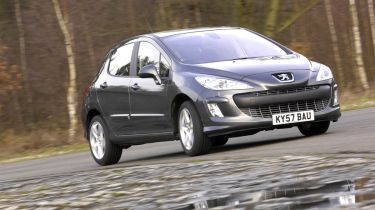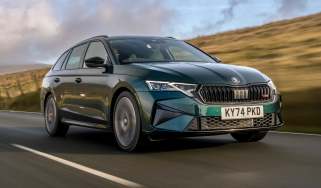Band D
There's a £25 increase in duty for Band D, which isn’t a huge rise over Band C, and with only a 14g/km spread, the range of emissions is smaller in this group, too
There's a £25 increase in duty for Band D, which isn’t a huge rise over Band C, and with only a 14g/km spread, the range of emissions is smaller in this group, too. But as it’s one of the central bands, the variety of cars to choose from is broad.
However, it’s a surprise to see one or two small city cars here. The Perodua Myvi 1.3 EZi proves that the budget Malaysian manufacturer has a lot of work to do on reducing emissions. Thanks to the drain of its automatic gearbox, it produces 151g/km of CO2. Go for the 137g/km manual, and not only will your fuel economy improve, but you’ll save yourself £25 a year.
The Myvi isn’t the only small car here, though. The 1.6-litre petrol Citroen C2 SensoDrive produces 151g/km, while in stark contrast to the tax-free Bluemotion version, the petrol VW Polo 1.4 emits 152g/km – yet still only has 80bhp.
If you’re a petrol fan, there are several more potent models that fall into this band – not least the BMW 120i. Aided by Efficient Dynamics, it puts out an identical 152g/km to the Polo, yet develops 170bhp. You’ll also find petrol versions of family car favourites such as the Ford Focus 1.6 and Peugeot 308 1.6 in Band D, both emitting 159g/km. However, as we revealed in our Band B focus on Page 48, the 1.6-litre diesels make more sense. Band D also sees the first 4x4 vehicles appear, including the new Subaru Legacy Sports Tourer 2.0D.
A CO2 output of 151g/km means it’s a far better option than the 2.0-litre petrol model, which puts out 61g/km more and adds £65 to your annual tax bill.
The same goes for another new Japanese diesel, the Mitsubishi Lancer 2.0 DI-D. OK, it’s not as exciting as the Evo X, but you will save £255 on your tax disc, thanks to a CO2 output of 165g/km, which is nearly 100g/km less than the top-spec model. However, if you want a bit more performance for the same VED cost, how about the Skoda Octavia vRS? Powered by the VW Group’s proven 170bhp 2.0 TDI diesel, it’s only front-wheel drive, but offers a good blend of pace, space and economy. And its 151g/km output means you’ll be two tax bands better off than if you’d opted for the petrol variant.
There are plenty of other good cars that sit just within this group. The BMW 525d (165g/km) is one of our favourite executive models, while the Ford S-MAX 1.8 TDCi (164g/km) is every bit as capable as the 2.0-litre version, but sits a band lower.
You’re not even excluded from glamorous coupés here – the beautifully styled Alfa Romeo GT 1.9 JTDM (165g/km) is a far more tax-friendly choice than the 2.0-litre petrol version.







